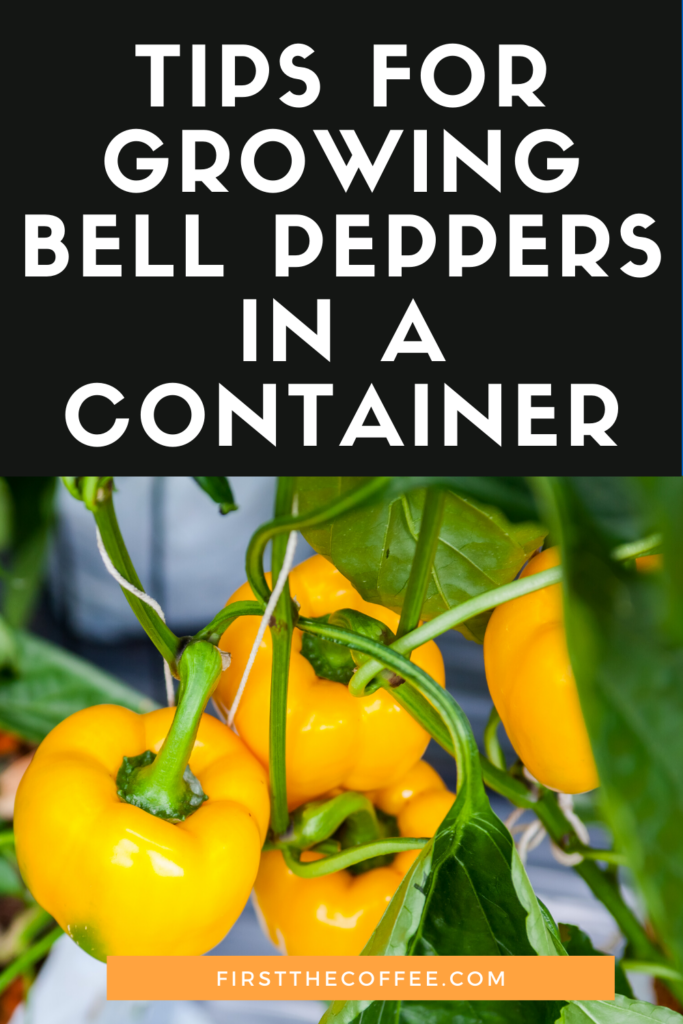Having a container garden is a great solution for small spaces, or for a balcony garden.
Bell Peppers on one of the variety of vegetables you can have growing in a container garden.
There are some things that you need to make sure you have right in order to grow bell peppers in a container successfully.

Growing Bell Peppers In A Container Tips
Keep The Pepper Plant Warm
Bell peppers are a warm weather crop.
This means growing bell peppers in a container is a great way to grow them, especially if you are in a colder climate area.
The ideal growing temperature for bell peppers is between 65 degrees Fahrenheit and 80 degrees Fahrenheit (18 C – 27 C).
Getting a New Bell Pepper Plant
With bell peppers you can either use good quality bell pepper seeds to propagate your own plants or you can get a bell pepper plant from a garden center or nursery.
If you choose to grow bell peppers from seeds you want to plant your seeds about 1/2 inch below the soil surface. Use several seeds per pot and then once you see the plants germinating you can thin out the plants to one per pot.
If you are starting the seeds indoors you can plant them 8 to 10 weeks before your area’s last spring frost date.
The Right Size Of Pot
When growing bell peppers in containers you want to make sure you have the right size pot.
You want to get a pot that’s at least 10 to 12 inches deep and 10 to 12 inches wide.
This is important so the plant can have a good root system to help it grow and produce those peppers you are after.
You also want to be sure that the container you use has a proper amount of drainage holes. You don’t want your bell peppers to be too wet, but also you don’t want them to dry out.
Make Sure the Watering is Just Right
Bell pepper plants require regular watering.
You want to keep the soil slightly moist, not too wet, and also make sure it doesn’t dry out completely.
Another thing to make sure of is that you don’t wet the leaves, this can lead to a fungal infection of your bell pepper plant.
It is also possible that you can over water the bell pepper plant, so make sure you don’t let your pot or container sit in water.
It’s best to water bell pepper plants early in the morning, as watering during the middle of the day the water will evaporate too quick to be of any benefit. Watering the plant at night would cause the soil to be wet for too long.
They Like Sunlight
Bell pepper plants love sunlight.
You want to make sure you pant the bell pepper plant in a place that gets at least 6 hours of sunlight each day.
Also make sure that the plant is in a location that it will be protected from strong winds.
Soil is Important
Soil is a big factor to having bell pepper plants in a container that give you a good amount of peppers.
Make sure to use a good quality potting mix that is loose and rich in organic matter.
I like to make sure I add compost to my soil mixture, as it will add tons of nutrients to the soil.
If you would like to learn about how to start your own compost check out How to Start Composting For Beginners.
Mulch Helps
Mulch is good to use on top of the soil in the container that your bell pepper plant is in.
Using mulch will reduce the evaporation of the moisture in the soil, helping the pepper plant not dry out.
Support The Plant
It is a good idea to give the main plant stem of your pepper plants some extra support.
You can use bamboo, wooden sticks, or any other type of support and tie the main stem to the support.
Feed Your Pepper Plants
It is especially important when growing any vegetable in containers to make sure you feed them.
You can do this by using fertilizer.
My favorite way to feed my plants is to use worm castings.
Another great option is to use a liquid plant food.


That is a great tip especially to those new to container gardening.